Fantasia 2019, Day 8, Part 3: Knives and Skin
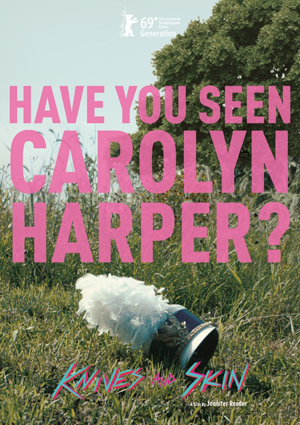 My last film of July 18 was in the big Hall Theatre. Knives and Skin was written and directed by Jennifer Reeder, and begins as a girl dies a violent death in a small midwestern town. In the wake of her disappearance secrets begin to come to light, and tensions rise among both her classmates and the adults. The movie proceeds to explore the town and its inhabitants in a series of sometimes-linked vignettes.
My last film of July 18 was in the big Hall Theatre. Knives and Skin was written and directed by Jennifer Reeder, and begins as a girl dies a violent death in a small midwestern town. In the wake of her disappearance secrets begin to come to light, and tensions rise among both her classmates and the adults. The movie proceeds to explore the town and its inhabitants in a series of sometimes-linked vignettes.
I have to say up front that I had a wildly different reaction to this film than the rest of the theatre did. The crowd was, by and large, audibly positive. This is a movie that has clear feminist principles, and is very direct about putting them on the screen. To judge not just from the reaction during the screening but the question-and-answer period after, many viewers responded to that, and good for them. Personally I didn’t care for the movie. I am going to explain why, but it’s important to note that this is a film that has the potential to work much better for people who are not me.
At its core, I felt that the dramatic structure of the film did not work. The various scenes did not seem to work as an ensemble, and individual characters did not have stories that felt fully developed. Much of the more interesting events that did happen had no obvious connection with the disappearance and death of Carolyn Harper (Raven Whitley). The movie felt to me like a series of short films, or ideas for short films, that did not cohere.
For example, near the end of the film the high schoolers who we’ve more-or-less followed through the film hear that one of their friends is on top of the school and might be about to jump. A group of a half-dozen or so teens gather out front of the school. It turns out that the youth on the roof isn’t going to jump, he just liked the view because it’s one of the few places he could see the road out of town. This is a problem for a number of reasons, but the first one is that a longing to get out of the town has not really been touched on or explored earlier in the film. It’s a perfectly credible motivation, but with no set-up or development it feels oddly gratuitous.
Then you wonder why, if this young man liked looking at the road out of town, nobody noticed the youth going up to the roof on any previous occasion. This brings up another problem: this town does not feel like a community of people who’ve known each other all their lives. People are too easily surprised by each other, or know too little about each other.
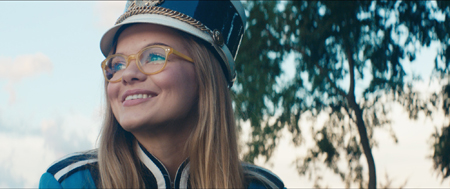 Then you wonder why the one part of town from which you can see the road is the top of the school. It’s a geographically odd arrangement, and it speaks to the lack of a sense of place in the town. We get to see various settings, and they are shot well — the movie looks quite nice, at least — but they don’t add up to an overall community. I couldn’t tell you how large the town is. Or what drives most of the people in it. Or how it feels to grow up there.
Then you wonder why the one part of town from which you can see the road is the top of the school. It’s a geographically odd arrangement, and it speaks to the lack of a sense of place in the town. We get to see various settings, and they are shot well — the movie looks quite nice, at least — but they don’t add up to an overall community. I couldn’t tell you how large the town is. Or what drives most of the people in it. Or how it feels to grow up there.
I will also note that the young man who likes looking at the road is African-American. Reeder has an ethnically diverse cast, particularly among the high schoolers, but if there’s any mention of race in the script I missed it. I note this because deliberately or not it defines the community. An interracial marriage is apparently unremarkable in this town, and apparently there’s no racism or racial tension in it, either.
To move from the young man on the roof to another example of a good idea without a dramatic structure behind it: two of the girls start a relationship, and apparently keep it secret. It is not clear why. One can of course guess. But lacking any dramatisation of what the stakes are for the relationship if it’s discovered, the secrecy feels like some kind of game instead of a necessity. This is a problem not only for what it does not say about this relationship but for what it does not say about the town and society overall.
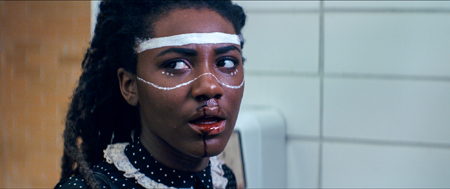 I thought the film was trying to put on the screen positive images of strong women, and especially of strong young women; but was uninterested in showing their strength dramatically as well as visually. This is a problem not only dramatically but also thematically. I’ve mentioned some of the issues I had with the story structure, but thematically the desire to demonstrate characters’ power by not showing them facing oppression is an odd choice for a consciously feminist filmmaker. There is one football player who is a bully; a couple of adults who are easily manipulated; but no sense of patriarchy as social structure or as a significant influence on individual lives. If the young people in this movie are expressing their independence, what are they expressing their independence from? I couldn’t tell you. This is a movie in which the most sympathetic adult character by far is a (male) cop. That’s an odd choice to make.
I thought the film was trying to put on the screen positive images of strong women, and especially of strong young women; but was uninterested in showing their strength dramatically as well as visually. This is a problem not only dramatically but also thematically. I’ve mentioned some of the issues I had with the story structure, but thematically the desire to demonstrate characters’ power by not showing them facing oppression is an odd choice for a consciously feminist filmmaker. There is one football player who is a bully; a couple of adults who are easily manipulated; but no sense of patriarchy as social structure or as a significant influence on individual lives. If the young people in this movie are expressing their independence, what are they expressing their independence from? I couldn’t tell you. This is a movie in which the most sympathetic adult character by far is a (male) cop. That’s an odd choice to make.
I will also say I found myself uncomfortable with the lack of specific attention to modern teen culture. Phones and the internet were present, but peripheral to the story. Songs and movies and TV shows from the 21st century went almost unmentioned, and that’s a particular problem because many of the girls are part of a chorus that sings a capella versions of 80s pop hits. It makes perfect sense for the middle-aged music teacher to select songs from her youth for the girls to sing (even if the covers are hit-and-miss at best). But the kids don’t get to have songs of their own, songs of their time, songs of now that make a soundtrack for their own lives.
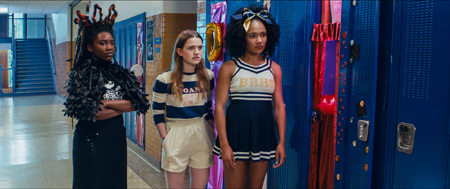 Knives and Skin has admirable ambitions. It’s shot with skill and experience. But to my mind it’s incoherent. It has no central unifying idea, and too little character development. Its presentation of teen life in a particular place and time was not especially convincing to me. Others clearly differ.
Knives and Skin has admirable ambitions. It’s shot with skill and experience. But to my mind it’s incoherent. It has no central unifying idea, and too little character development. Its presentation of teen life in a particular place and time was not especially convincing to me. Others clearly differ.
After the film, Jennifer Reeder took questions; as usual, what follows is from my scribbled notes. Asked about the title, she said the movie was originally As With Knives and Skin. The intended contrast is that knives are dangerous and utilitarian; skin is utilitarian but vulnerable. These things were meant to be about survival and survival strategies. To another question she said she loves horror and thriller movies, but was uneasy about films that had images of dead or missing girls at their core. She wanted to do a film with a missing girl at its heart, and came up with strategies to make Carolyn a willful body, moving herself around town and in some way affecting the residents. She noted that while people often compare this film to Twin Peaks, she thinks of other films such as River’s Edge.
 Asked about her use of 80s pop, she spoke about using it in her shorts, and knowing it worls. She wanted in this film to turn songs into eulogies and have them come out of natural moments. She particularly wanted to have people listen to female voices in harmony. A soundtrack will be released, with a score by a member of the Yeah Yeah Yeahs. Reeder was asked about the lighting, and she said she wanted the film to hover above reality — which was also why she kept the town nameless — and so bathed it in magenta and femme colours. Asked about her production timeline, she said there were 25 days of shooting; then on a related note spoke about the importance of short films.
Asked about her use of 80s pop, she spoke about using it in her shorts, and knowing it worls. She wanted in this film to turn songs into eulogies and have them come out of natural moments. She particularly wanted to have people listen to female voices in harmony. A soundtrack will be released, with a score by a member of the Yeah Yeah Yeahs. Reeder was asked about the lighting, and she said she wanted the film to hover above reality — which was also why she kept the town nameless — and so bathed it in magenta and femme colours. Asked about her production timeline, she said there were 25 days of shooting; then on a related note spoke about the importance of short films.
To another question (that I did not catch) she spoke about the way a character covered things in their house as a response to environmental sensitivity. Asked about her approach to writing teens, Reeder said that some of her short films were adult coming-of-age films, and that it was problematic to call second comings-of-age crises. She said she loves difficult women, and difficult mothers getting it wrong, and showing young people with agency; she said there is much to be learned from the young.
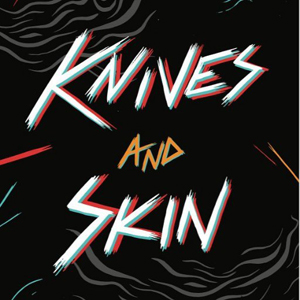 Asked about the film’s relationship to Twin Peaks, she said it was something she’d watched in the 90s, but said other films by Lynch were more influential, including Blue Velvet, Eraserhead, his shorts, Inland Empire, and Lost Highway. She said she loves the Lynchian take on small towns, the mix of light and darkness, and the consciously stiff dialogue. She also noted she feels the film is more John Waters than John Hughes.
Asked about the film’s relationship to Twin Peaks, she said it was something she’d watched in the 90s, but said other films by Lynch were more influential, including Blue Velvet, Eraserhead, his shorts, Inland Empire, and Lost Highway. She said she loves the Lynchian take on small towns, the mix of light and darkness, and the consciously stiff dialogue. She also noted she feels the film is more John Waters than John Hughes.
To a final question, on a mother in the film, she spoke on some of the more surreal aspects of the movie, and wanting there to be hope there’s a parallel universe where (for example) a tiger printed on a shirt can talk and give advice. She spoke about the complications of motherhood, and how films portray mothers as wet blankets and not sexual. She also spoke about wanting to dispel what she called the myth of the mean girl, saying she thinks the culture tells girls they’re bitches when they are fact adopting survival strategies.
That ended the questions, and the eighth day of the Fantasia Festival. I’d be back the next day for more films, again different from each other and what had come before.
Find the rest of my Fantasia coverage from this and previous years here!
Matthew David Surridge is the author of “The Word of Azrael,” from Black Gate 14. You can buy collections of his essays on fantasy novels here and here. His Patreon, hosting a short fiction project based around the lore within a Victorian Book of Days, is here. You can find him on Facebook, or follow his Twitter account, Fell_Gard.
“I have to say up front that I had a wildly different reaction to this film than the rest of the theatre did.”
Oh-ho, don’t short-change the two other people who agreed with you — and in fact liked this movie even less than you did. (Neill, where are you? I need back-up.)
Every criticism you raise is valid and, cumulatively, knee-cap the entire exercise. I tallied 1.5 bullies in the school, vs 8+ odd-balls we get to know — most of whom have much more agency than their ill-advised actions would suggest. The whole opening set-up is beyond comprehension: a young woman with an utter disinterest in intimacy arranges to have sex with the school football bully, and then carves her initial in his forehead. Then that girl’s mother arranges to have sex with him at a later point as an example of… What, exactly?
“Knives and Skin” does have a strong feminist agenda, but as a movie it plays as if that agenda, with all its ambiguity, is just stapled on to an inadequate “small-town-doings” story framework.
I’ll admit that the Q & A didn’t help my dismissiveness of the movie — the director whinged, and seemed to have far too much to prove for someone who, as an artist, filmmaker, and mother, had absolutely nothing to prove.
(And the lesbian relationship makes zero sense. Where did the other girl come from? Why was the primary girl sitting in the library doing medical-grade sketches of feminine anatomy?)
…Anyway. I am still surprised when I recollect how well this went over with people I interacted with. Perhaps we’re just cold inside.
Fair point about there being a minority of people in the theatre who disliked it. Maybe it’s accurate to call the movie particularly polarising.
I wonder about the Q&A, too. It’s tempting to read a filmmaker’s attitude to a film into their bearing in the Q&A, which … I mean, you’re right she seemed far less upbeat than most directors, who’re usually happy to see their film on screen. And you’re right she had nothing to prove, given her established career.
Anyway, as a critic, I gather it’s a job requirement that I be cold and dead inside, so, well, there we go!